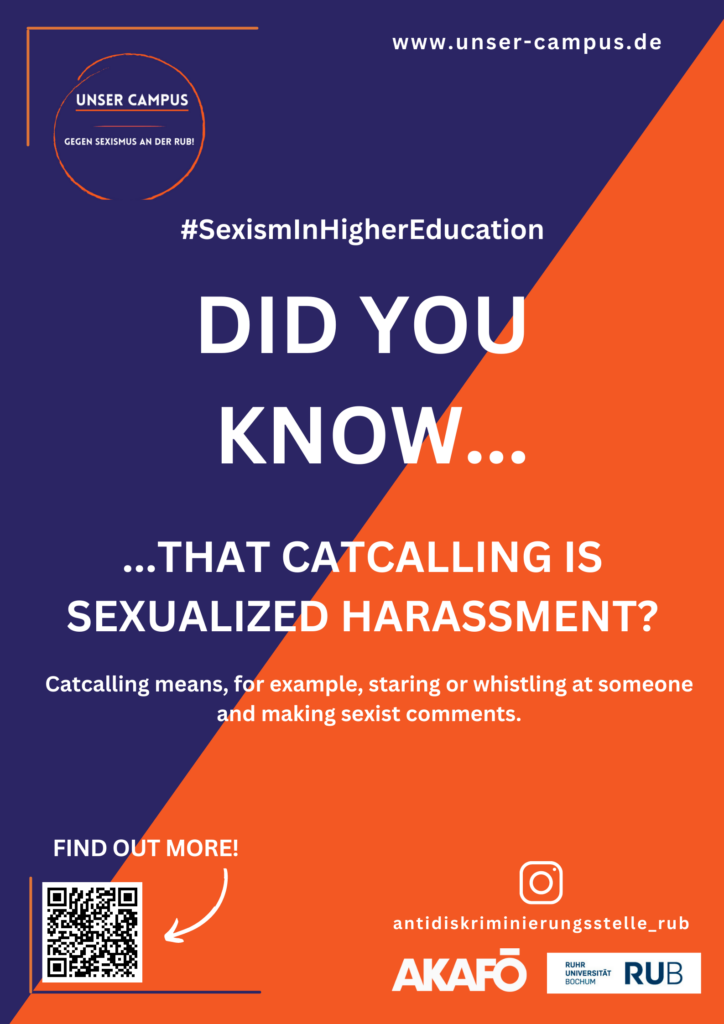
„Hey baby, smile!“, „Oh! Sexy!“ or „Hot ass!“.
Maybe you or someone you know has been called such comments.
Such behaviour is called catcalling.
Catcalling is a sexist phenomenon that occurs worldwide in the form of unwanted lewd comments, whistles or obscene gestures and thus violates the dignity and sense of safety of people, especially FINTA* people.
Unfortunately, catcalling is very common in public spaces. For example, it takes place in means of transport such as buses and trains, which we all use every day. Here people experience harassing remarks, unwanted advances or even physical touching. This contributes to the fact that public spaces are often unsafe for FINTA*. Catcalling is also widespread on campus, students and especially FINTA*, can be victims of sexual harassment by fellow students or even lecturers. For example, there may be lewd remarks, unwanted messages or inappropriate touching at university. And when people feel uncomfortable on campus, their academic and personal success suffers as well.
From a feminist perspective, catcalling is a problem that exists because we live in a society where gender inequality prevails and where many people are objectified and sexualised on a daily basis. It is an expression of power and control over people, especially FINTA*, by assigning them a certain role. It is important to understand that catcalling is not harmless but part of a larger system of discrimination and violence against FINTA*, LGBTIQA+ and BIPoC. Education and awareness raising are essential strategies to address discrimination and violence. Universities and other educational institutions must therefore create safe environments and actively combat sexual harassment by having clear rules, training for all members of the campus and support for victims.
We want to promote a culture of respect and equality with the awareness campaign OUR CAMPUS – Against Sexism at RUB! RUB and AKAFÖ are committed to educating and raising awareness among students and employees on the topic of sexism in the university context. We find: Catcalling must be recognised as a serious problem and we must work together to overcome this culture of harassment! Because FINTA* and people of all genders have the right to live freely and safely in public. Through your and our feminist commitment, we can help create a campus and a world where catcalling is a thing of the past and equality becomes a reality for all.
Got curious?
Follow us on Instagram at @antidiskriminierungsstelle_rub and visit our blog to never miss any news and actions! We are also very happy to receive enquiries for cooperations and workshops.
There are various initiatives and counselling centres that can offer help and support to those affected by catcalling. Here are some of them:
NORA e.V. is a counselling centre for women and girls in the Kortumstraße in Bochum and is committed to combating violence suffered by women and children and to promoting the interests of women and girls. NORA e.V. advises women in a biased, competent and professional manner, free of charge and confidentially.
NORA e.V.
Counselling for women and girls
Kortumstr. 45, 44787 Bochum, Germany
Open counselling (without appointment)
Tuesday: 2.00 – 4.00 p.m.
Thursday: 10.00 a.m. – 12.00 p.m.
Appointments by arrangement
Telephone: 0234 – 96 29 995 and 0234 – 96 29 996
Fax: 0234 – 96 29 997
Email: nora-beratung@freenet.de
Women’s counselling centres NRW:
In many cities in North Rhine-Westphalia there are women’s counselling centres that offer support for FINTA* in various life situations. Here, those affected by catcalling can find counselling and help.
You can find an overview of the women’s counselling centres in NRW here.
Help hotline Violence against women:
The help hotline is a nationwide contact point that can be reached around the clock. It offers help and advice to FINTA* who are affected by violence. Those affected by catcalling can also find support here.
You can reach the help line via the following number: 08000 116 016.
Police and local authorities:
Catcalling can be a criminal offence in some cases. If you are affected, you can report to the local police to file a complaint and take legal action.
Initiatives:
The Catcallfreie Zone initiative is active in Bochum and the surrounding area and campaigns against catcalling with (photo) actions and educational work. More information about catcalling and their campaigns can be found on their website.
Here you can find the Instagram page of Catcallsofbochum.
The initiative @catcallsof is internationally active and has its own Instagram page in every major city in Germany. The aim of the initiative is to collect and share the experiences of people who have been catcalled. It also organises events and networking meetings on the topic.
You can find more information about the initiative here.
Sources and furtherreading:
Kearl, Holly. Stop street harassment: Making public places safe and welcoming for women. Bloomsbury Publishing USA, 2010.
Klümper, Hannah: Catcalls– Auch Worte sind Belästigung. München, dtv, 2022.
Mädchenmannschaft: Debatten um Feminismus, Geschlecht und Sexismus: https://maedchenmannschaft.net/?s=catcalling zuletzt aufgerufen am 06.10.23
Pantelmann, H., & Blackmore, S.: Sexualisierte Belästigung, Diskriminierung und Gewalt im Hochschulkontext: Herausforderungen, Umgangsweisen und Prävention. Wiesbaden: Springer Fachmedien Wiesbaden, 2023.
Peterson, Z.D., Carver, D.N., Klann, E.M. et al.: Sexual Harassment and Assault in Public Spaces: Individual Vulnerability and Contextual Risk Factors. Sex Roles (2023).
Vera-Gray Fiona & Kelly, Liz.: Contested gendered space: public sexual harassment and women’s safety work. International Journal of Comparative and Applied Criminal Justice, 44:4, 265-275, 2020.

